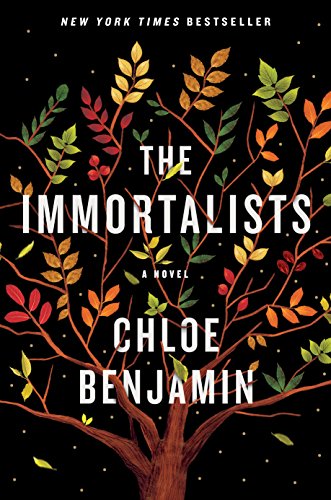Beginning The Immortalists after an astoundingly bad day resulted in intense nightmares. After the second dream of my dead father—deceased Jewish fathers being a major catalyst for the Golds in Chloe Benjamin’s book—my only option was to read my way past a night when the dark outside the bedroom window felt stuck inside of me.
The Immortalists is about four siblings and destiny. On a summertime lark, they sneak away to see a spiritualist and are each given their “death dates.” Readers travel through the lives of each sibling, carried by great writing, watching how information leads to choices and choices shape lives and deaths.
Reader susceptibility differs. A reader can be vulnerable to—or guarded against—the book they pick up, on a whim, to read. In my case, not only did nothing go right the day I began The Immortalists, but when I attempted to recalibrate and compensate, things got worse. At the end of that day, I felt the only thing I could do was drown my sorrows by escaping from reality into bookworld.
The Immortalists portrays the same small, life-drama (I have no choice. I give up) on a page that felt bigger and more real than the real world. The Gold siblings lived their lives and I couldn’t get enough. I slammed the book like it was alcohol on my 21st birthday, shot after shot of it, even after it made me like an emo drunk; loving, crying and in some cases, wishing I could vomit and get it over with.
The book’s structure is a clear, easy to follow roadmap. Four points of view; four parts (and a prologue). It’s similar to the bartender’s companion my younger brother gave me to use as a guide for turning 21. The idea was to drink as many kinds of drinks as I could, checking them off as I went.
Like tasting new cocktails, I was fascinated by the four lives of the Gold siblings; the way they mixed well or contrasted each other. Aspects of the characters resonated. Other elements were off-putting and alienating. All together it was a reading experiment that kept me both engaged and aware of my own emotional reactions to the fictional lives. Like drinking as many kinds of drinks as your body can handle when turning 21, it was a challenge that made me happy.
That’s how this book hit me: The story and the writing are so good that the novel goes down the hatch, smoothly into the stomach, directly into the bloodstream. Drink in the lives of these strong characters. Good and admirable and lovable; living lives, making choices, screwing up.
And when things go bad, they’re so bad. Reading this book was binge drinking all night long. It is exciting to finish Part One, and after consuming it, you’ve surrendered any good judgment you ever had. The influence of the tale is all-encompassing. I was unable to put it down. I continued reading to get it out of my system but the memory will always be a part of me.
The next day I was tired. Luckily, reading all night doesn’t get you as shitfaced and alcohol poisoned as I was at 21.
There is some graphic language, some violence, and a hell of a lot of well-crafted suspense in this book. Surprising, in a novel that spans four decades, and follows the “normal” lives of four white Jewish kids. It should be as wonderbread of a story as it comes—but it isn’t. It tackles the roughest topics: 80’s AIDS, mental health, privilege, mindfulness, birth, kindness, prejudice, animal cruelty, love, addiction, adoption, success, and death. If you succumb, this book will terrify you and make you cry more than laugh. It has funny moments, but the humor is dark.
Dark like the excellent dry-erase-marker cartoon of me projectile vomiting after my 21st birthday. I found it the next day, drawn on the house whiteboard. My brother has his own ways of dealing with things, making them funny. I wasn’t ashamed by the “Happy 21st Birthday” message. I too thought it was funny. And I’m not ashamed of using a book to escape; to exorcise a particularly bad day full of foul mood. Sometimes we need that intensity to make us make a shift. Books are, after all, easier on the body than booze.
I’ve processed the nightmares, and I’m ready for my new book club, so it is going to be an altogether better day. But The Immortalists may not be a good choice for reading late if you tend to be a sensitive reader. Bad shit happens to good people. It is depressing and terrifying at times…but more than anything else, it is a good time and a great read.

What do you think?